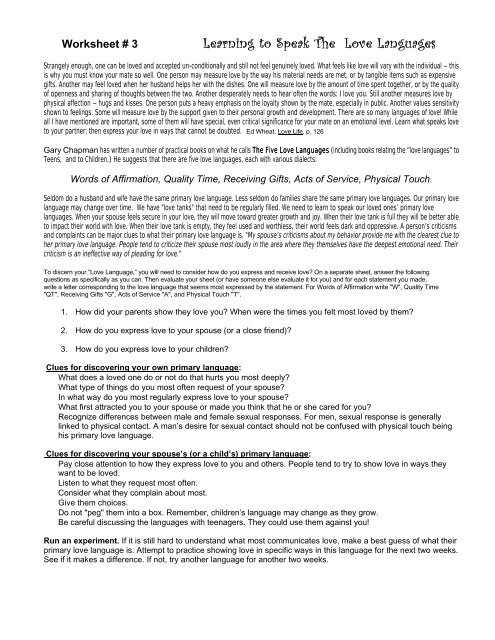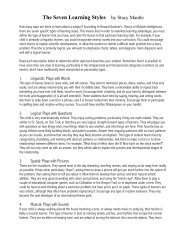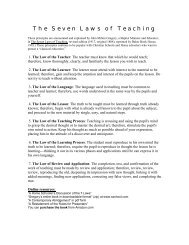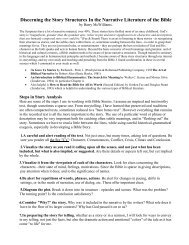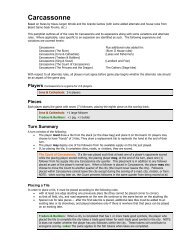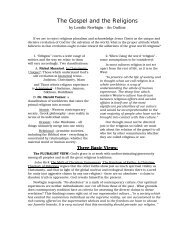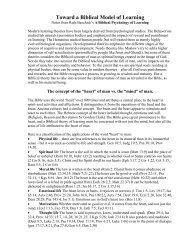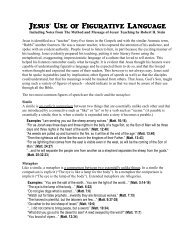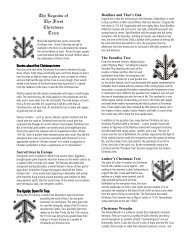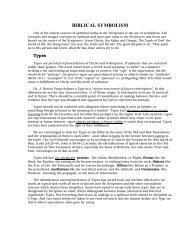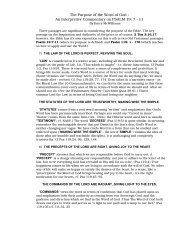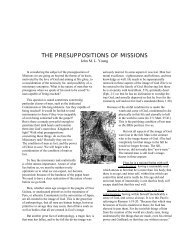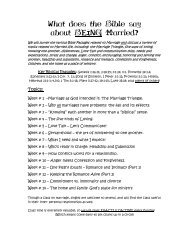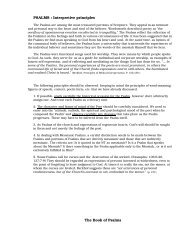The Five Kinds of Love The Five Kinds of Love
The Five Kinds of Love The Five Kinds of Love
The Five Kinds of Love The Five Kinds of Love
Create successful ePaper yourself
Turn your PDF publications into a flip-book with our unique Google optimized e-Paper software.
Worksheet # 3<br />
Learning to Speak <strong>The</strong> “<strong>Love</strong> Languages”<br />
Strangely enough, one can be loved and accepted un-conditionally and still not feel genuinely loved. What feels like love will vary with the individual – this<br />
is why you must know your mate so well. One person may measure love by the way his material needs are met, or by tangible items such as expensive<br />
gifts. Another may feel loved when her husband helps her with the dishes. One will measure love by the amount <strong>of</strong> time spent together, or by the quality<br />
<strong>of</strong> openness and sharing <strong>of</strong> thoughts between the two. Another desperately needs to hear <strong>of</strong>ten the words: I love you. Still another measures love by<br />
physical affection – hugs and kisses. One person puts a heavy emphasis on the loyalty shown by the mate, especially in public. Another values sensitivity<br />
shown to feelings. Some will measure love by the support given to their personal growth and development. <strong>The</strong>re are so many languages <strong>of</strong> love! While<br />
all I have mentioned are important, some <strong>of</strong> them will have special, even critical significance for your mate on an emotional level. Learn what speaks love<br />
to your partner; then express your love in ways that cannot be doubted. Ed Wheat, <strong>Love</strong> Life, p. 126<br />
Gary Chapman has written a number <strong>of</strong> practical books on what he calls <strong>The</strong> <strong>Five</strong> <strong>Love</strong> Languages (including books relating the “love languages” to<br />
Teens, and to Children.) He suggests that there are five love languages, each with various dialects:<br />
Words <strong>of</strong> Affirmation, Quality Time, Receiving Gifts, Acts <strong>of</strong> Service, Physical Touch.<br />
Seldom do a husband and wife have the same primary love language. Less seldom do families share the same primary love languages. Our primary love<br />
language may change over time. We have "love tanks" that need to be regularly filled. We need to learn to speak our loved ones’ primary love<br />
languages. When your spouse feels secure in your love, they will move toward greater growth and joy. When their love tank is full they will be better able<br />
to impact their world with love. When their love tank is empty, they feel used and worthless, their world feels dark and oppressive. A person’s criticisms<br />
and complaints can be major clues to what their primary love language is. "My spouse’s criticisms about my behavior provide me with the clearest clue to<br />
her primary love language. People tend to criticize their spouse most loudly in the area where they themselves have the deepest emotional need. <strong>The</strong>ir<br />
criticism is an ineffective way <strong>of</strong> pleading for love."<br />
To discern your “<strong>Love</strong> Language,” you will need to consider how do you express and receive love? On a separate sheet, answer the following<br />
questions as specifically as you can. <strong>The</strong>n evaluate your sheet (or have someone else evaluate it for you) and for each statement you made,<br />
write a letter corresponding to the love language that seems most expressed by the statement. For Words <strong>of</strong> Affirmation write "W", Quality Time<br />
"QT", Receiving Gifts "G", Acts <strong>of</strong> Service "A", and Physical Touch "T".<br />
1. How did your parents show they love you? When were the times you felt most loved by them?<br />
2. How do you express love to your spouse (or a close friend)?<br />
3. How do you express love to your children?<br />
Clues for discovering your own primary language:<br />
What does a loved one do or not do that hurts you most deeply?<br />
What type <strong>of</strong> things do you most <strong>of</strong>ten request <strong>of</strong> your spouse?<br />
In what way do you most regularly express love to your spouse?<br />
What first attracted you to your spouse or made you think that he or she cared for you?<br />
Recognize differences between male and female sexual responses. For men, sexual response is generally<br />
linked to physical contact. A man’s desire for sexual contact should not be confused with physical touch being<br />
his primary love language.<br />
Clues for discovering your spouse’s (or a child’s) primary language:<br />
Pay close attention to how they express love to you and others. People tend to try to show love in ways they<br />
want to be loved.<br />
Listen to what they request most <strong>of</strong>ten.<br />
Consider what they complain about most.<br />
Give them choices.<br />
Do not "peg" them into a box. Remember, children’s language may change as they grow.<br />
Be careful discussing the languages with teenagers. <strong>The</strong>y could use them against you!<br />
Run an experiment. If it is still hard to understand what most communicates love, make a best guess <strong>of</strong> what their<br />
primary love language is. Attempt to practice showing love in specific ways in this language for the next two weeks.<br />
See if it makes a difference. If not, try another language for another two weeks.


